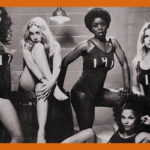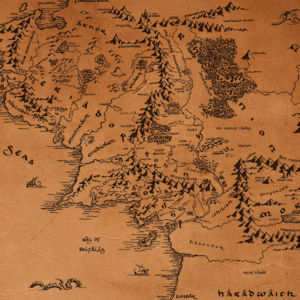
Dear Rick Moody: What Should I Say About My Scars?
A Complicated Past Doesn't Need to Be a Complicated Present
Dear Rick Moody, Life Coach,
I tend to be a fairly private person.
Twelve years ago, at the age of 31, I was in a very stressful situation in my life. My mother had become angry with her parents when they called her out, in front of my stepfather, for lying about having worked her way through college as a private detective, when they had, in fact, paid her tuition. She then concocted a story whereby she had been suffering from amnesia since the age of 21 (I know it’s a fabrication, because her letter to me included details such as “the amnesia was caused by a blow to the head when the house I was babysitting in was broken into by a man who intended to burglarize it, and he snuck up behind me and struck me on the back of the head with the butt of a gun.” Her mistake was in going on to mention the perpetrator was never caught). Her reason for revealing this to me was to tell me that she had recently been using self-hypnosis to recover her memory and now she remembered all of the satanic ritual abuse my grandparents had subjected her to.
I’ll wrap it up by getting to the point: I was placed in the middle of this feud, my mother wanting me to disown her parents and my grandparents wanting me to help them force her into psychiatric care (which was never going to happen, as my step-father believed his wife).
After two years of dealing with this and not finding a way to either resolve it or convince them to leave me out of it, I decided the simplest solution was to simply kill myself (thus removing myself from the situation).
After reviewing various options, I decided to slit my wrists (and my antecubital veins, once I realized I wasn’t bleeding fast enough from my wrists—I thought veins would work if I cut them lengthwise and kept them in water), having decided a gun would be too gruesome for the person who would ultimately discover me, trying to find pills might tip someone off, and jumping from the Golden Gate Bridge might result in my body going missing, which might leave my loved ones without closure. I misjudged the amount of time I needed, and I was discovered by my landlord, while still barely alive (sent to check on me when I didn’t show up for work, or call in sick). After I ended up in the ICU, my amazing circle of friends dropped everything to be there for me (my family chose not to visit), and I realized I needed to make the best of being alive, so they wouldn’t be burdened by needing to keep constant vigil.
Jump ahead and I’ve since returned to college and changed careers, becoming a critical care RN. Which brings me to my question.
I’ve just started training at the hospital where I work, to be certified in using an ultrasound to map veins and place IV catheters in patients with poor vascular access. As I was sitting in the first class, it came up that we would be practicing on one another. I usually wear long sleeve t-shirts under my scrubs to cover my scars. I’m not ashamed of what I’ve been through, as I believe it has made me a better, and more compassionate nurse. However, I have worked there for years and never told anyone I work with about my experience, and I know some awkward questions are likely to arise (likely more uncomfortable for my co-workers, than for me).
How would you suggest I answer questions about my scars, without going into unnecessary details (I’d rather not be the cause of both cringing and boredom)?
Sincerely,
More Literally, than Figuratively, Scarred
Dear Literally,
This is an amazing letter in any number of ways. First, it is the only letter I’ve received so far with the words “satanic ritual abuse” in it. I have a great deal to say, someday, about “satanic ritual abuse,” when there is a letter on this subject expressly, but I will not be sidetracked today, except to say that it is my belief that there is no such thing, anywhere, as “satanic ritual abuse,” excepting among teenagers and people in their twenties with too much time on their hands, who play black metal and imagine that the world is far more dense with the unseen than it really is. In my last life coach message, I did quote C.G. Jung as saying there was an “evil principle” in the world, by which he means, I think, that there is a force that travels resolutely in the direction of the inhumane and depraved, and I believe there is merit to Jung’s argument, but I don’t think the evil principle is headed up by any fire-breathing potentate who demands that misguided teens, or demonic grandparents, or preschool teachers, light candles in the shape of a pentagram and play Cannibal Corpse and then bite the heads off chickens in the pursuit of chaos.
Accordingly, because the dreaded “satanic ritual abuse,” or SRA, as it is sometimes abbreviated, is invoked by your mother, we can plausibly associate her with one or another of the personality disorders, because as with the mother who led the charge in the McMartin Preschool case (who died of alcoholism before the first of the trials associated with that debacle), only a person thus afflicted could adduce SRA as an explanation for anything much and expect it to command respect.
I do not mean to make light of this mother. Rather I can only express sympathy as regards what you must be enduring with her. I have known well any number of people with mentally ill or disturbed parents, and while many of them have moved through the field of difficulty and triumphed, it is, without a doubt, a great burden to bear, wherein the parent given to nurture us and get us through the early years of infancy and toddlerhood turns out to be ill-equipped for parenting in the long run. I wish that it were otherwise.
That this situation—an unstable mother, and the double-bind (see Gregory Bateson on this topic) of trying to navigate between her and your grandparents—caused you to lose faith in your own life, this is too tragic to address fully in the confines of a life coach letter. Obviously, it is never worth it, the cutting short, and it is a permanent solution to a temporary problem. Apparently, your mother has moved on with her complex and difficult life, and didn’t really dwell overlong on your crisis, and therefore your demise was not going to solve that particular problem, except that your mom wouldn’t have you around anymore for the engagement of mothers with daughters. But you know all this. It wasn’t worth it. That you are here, able to write this letter, to open up and face the preliminary causes of what led to your attempt, this is admirable and important.
The question you ask is evidence of the important work you have done, because it is a question about candor. The free and open avowal of the scars on your wrists is evidence of candor, and acceptance, and these are the only way a fulfilling life can be lived, ultimately, with an acceptance of who we are, where we come from, and a reasonable affection for the mistakes and flaws of our younger selves. I confess that I have literal regret about my younger self. I feel less regret now than I did formerly, but I have felt regret, especially about rash remarks and impulsive decisions I made. My own twenties, for example, are pitted with black holes of regret. But now at a later point I have begun to systematically attempt to replace regret with an honest accounting of who I was and where I am now. It seems that is the only way to integrate fully, to individuate, as I go forward in my journey.
It is true that your profession, the profession of nursing, is a compassionate profession, but no doubt one that also relies on the bravery and sturdiness of its participants. They may not want to know about your scars. They may be fine with looking at the scars, but may not want to ask. This would be the human thing to do, in fact. I had a friend in college who had badly scarred wrists. And he did nothing to cover them. Interestingly, he is one of the friends from that time with whom I have stayed closest over the years, and he is an individual who has grown resolutely into his adulthood, and he still has the scars, I presume, but I never look at them—they are functionally invisible—and there is no real need to go into the topic anymore. He’s a successful visual artist now. This is the acceptance model of scar exhibition, and while our sample size is small in this anecdote, it is persuasive. Never complain, as I once heard it said, and never explain.
I am told that the millennial sign of survival, the kind of survival you are writing about, is the semicolon. That is, I believe people who survive suicide occasionally get a semicolon tattooed on themselves somewhere, at least in certain circles. To indicate what has taken place. I assume this is sort of an emoticon semicolon, a signifier of winking. But what if it were also about the semicolon, that advanced punctuation mark, a conjoiner of disparate hunks of text, a bit of glue for a run-on, such as life is a run-on, in which the semicolon of survival conjoins the life that was to have ended with the life to come, and is the moment of juncture. The tattoo is the indicator of this marriage of disparate halves, what was, and what is to be. In this interpretation, literally, your scars are suturing back together the temporal rupture between your ended self and your continuing self, and the discomfort, if indeed there is any, among your professional acquaintances, is that they are briefly seeing the sign of the ended self, only to have it replaced with the triumph of survival.
Perhaps this is to see the scar as a threshold, a liminality, a hinge on the doorway into a future, and on that basis there is nothing at all to be afraid of in the scar (indeed, as I know this letter is relatively old, and I am just now getting to it, I assume that this test you have asked about has already passed, and I am going to guess that it passed without incident, and that you have moved on to other interests, and in this case your letter serves as a affirmation of candor for all who come after you), nor is there anything to be ashamed of, in the hinge of your semicolon, and, if anything, all your scar says now is that you know you have a future, and you are happy to have been questioned on the matter of your future, to have felt the travails of the future, and to say yes to them, yes, after all, I want a future, I believe in a future, I can make the most of a future, especially with the love and support of my friends.
The force of survival, when counterposed against, for example, SRA, against the kind of delusional mass-hysteria of SRA, is an indicator of what a great job you have done. Literally. Here you are, interested in the stories of those who have struggled, interested in the moral dimension of what has happened, interested in how to continue to survive and even to thrive, at the spot where the hinge brings into view the possibility of a future, and what can a life coach say to your resolution but congratulations and keep up the excellent work? The conversation about the scars can be exceedingly brief, henceforward, if it needs to be at all, and no matter what you say what you really seem to mean is: look here at my commitment to my future.
We should all be so committed.
All best,
Rick Moody, Life Coach
![]()
You too can receive life coaching from Rick Moody: email rickmoodythelifecoach@gmail.com
Rick Moody
Rick Moody was born in New York City. He attended Brown and Columbia Universities. He is the author of four previous novels: The Four Fingers of Death, Purple America, The Ice Storm and Garden State, as well as an award-winning memoir and multiple collections of short fiction. Moody is the recipient of a Guggenheim fellowship, and his work has been anthologized in Best American Stories, Best American Essays, and the Pushcart Prize anthology. Moody lives in Brooklyn, New York.



















